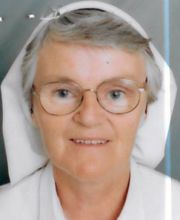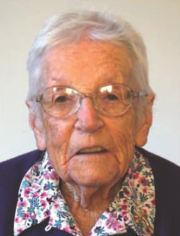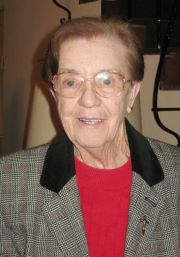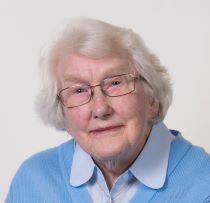
 Sister Patricia Murphy
Sister Patricia Murphy
1921 – 2016
Born: 6th January 1939
Entered Religious Life: 3rd February 1975
Died: 22nd April 2016
The eulogy given at Sr Patricia’s funeral Mass by Sr Rita Dawson, Provincial of the English/Scottish Province
I would like to acknowledge Patricia’s brother Gerard, her sister Nan and sister-in-law, Margaret, together with nieces, nephews and cousins who are here with us today.
Sr Patricia was born in Yoker/Clydebank, one of 14 children to Alice and Francis Murphy. This must have been a very lively household with plenty of fun and games.
Sr Patricia worked from the age of 15 and was employed in the same pharmacy for 21 years. She was the last to leave home.
Sr Patricia entered the Religious Sisters of Charity in 1975 when she was 36 years old. She described it as a hard time leaving her mother. Her father had died in 1970 and her mother died in 1976, just 1 year after she entered religious life.
Patricia started her religious life in Kilkenny working in Child-care for 13 years. She moved to Donnybrook in 1990, before setting off to Zambia in 1991. Zambia meant everything to Patricia and she spent almost 18 years there. She was heartbroken when she was not able to return. Sr Patricia retired to Airdrie in 2009 following ill health.
Before entering religious life, Patricia was a really good netball player and became a coach and umpire. Her team, St Peter’s, won many trophies and she was well respected by the Scottish Netball Association. Several of Patricia’s nieces played netball and were also on her team.
Patricia was great fun to be with, she loved singing and dancing and she played the bodhran (a traditional Irish drum). At family gatherings she would be up at the microphone singing and would join in all the dances. She had a great sense of humour. Her niece Alice describes her as a bit of a Maria from The Sound of Music.
During her holidays, Sr Patricia spent her time at home with her sister May. All of May’s children grew up around her. Patricia really loved children, she loved being around children all the time.
Sr Patricia had an invincible spirit, nothing got her down. She never complained in spite of her poor health and disabilities and would want to take on things – sometimes taking on tasks which were way beyond her physical capabilities.
She had great joy from simple things like sitting in the sun or walking, or sitting down to have a cup of tea! She was a gentle, gracious woman appreciative of everything that was done for her. Even in the midst of her own struggles, she would always ask you how you were.
Pope Francis talked yesterday about the Good Samaritan. He said “let us never forget, we cannot stand by as onlookers when you see so many people worn out by hunger, violence and injustice’. He called on each one of us to become Good Samaritans in our everyday lives because to ignore man’s suffering, means to ignore God. He reminded us of the parable of the Levite and the Priest who walked by the man who had been attacked by thieves and lay on the side of the road. Their inaction was contrary to the law of the Lord. The law obliges us to help everyone in distress. Compassion is an essential characteristic of God’s mercy and in the gestures and actions of the Good Samaritan, we recognise the action of God’s mercy throughout history. It is the same compassion with which God encounters each of us never ignoring us, He recognises our pain. He knows when we need help and consolation. He comes close and never abandons us. Like Jesus, we can become close to anyone who is needing our help.
To live, as Patricia did, in total commitment to her vocation, and to endure what she has endured over the last couple of years, and then to die so calmly and bravely, is in fact the equivalent to having lived a very full life. It shows it is not the length of life that matters but the intensity and quality of it. It is not so much death that frightens people but a life without meaning. Certainly Patricia’s life was full of meaning and she was indeed a Good Samaritan to so many people during her life. We now know she has gone to the God she has loved and served during her time in this world.
I should like to thank Father Raymond Breslin and all of the clergy here today for giving so much of your time to be here with us on this sad occasion. Our grateful thanks to Dr Gordon Canning and his Palliative Care Team at St Andrew’s Hospice and to all the staff there for their lovely care of Sr Patricia in her final journey.
I had two messages one from Nigeria and the from Zambia which I would like to read. They said
“Patricia was a very good community Sister. May she rest in peace.”
“We are indeed losing a great woman who has done us proud with her dedication and humble service to God’s people. May her gentle soul rest in peace.”
May Patricia now Rest In Peace.
We are standing this morning on holy ground: the place where Mary Aikenhead spent the last years of her life as an invalid – a woman whose vision, courage and practical common-sense gave birth to our Congregation and to our long and graced history of service of the poor, the weak and the vulnerable.Today we are celebrating the life of Sr. Joseph Helen, a woman who cherished that charism, serving those in need with fidelity and generosity, and who also spent the last years of her life here in the Hospice.
The readings this morning are both comforting and challenging.In the Gospel Jesus speaks of himself as the Way, the Truth and the Life.He invites us to put our hope and our trust in Him and in His promise to be with us, steadily and constantly as we try each day to walk his way, to speak his truth, to live his life.It is an apt description of the life and commitment of the woman whom we are remembering here.
In her 103 years of life, Sr. Joseph Helen lived through historical and global changes that are impossible for us to imagine.She experienced seismic shifts in Church and state.She witnessed wars and famines on a world scale.Through all of those yearsshe remained steadfastly faithful to the constant core of who she was as an RSC.She was born Dorothy Cunningham in Ballacolla in Portlaoise on 1st July 1908. She was an only girl, with one brother, and was much loved by all.Her childhood and youth reflected the calm ordinariness of children’s lives at that time.Following her degree studies she spent some months caring for her mother who was ill and then secured a job teaching in Mountjoy St. School in Dublin.Her father was not impressed!His comment on hearing of that place was:“It doesn’t sound like much of a job but you like working for the poor and you’ve always been good at it”.She remained there until she entered the Sisters of Charity on 5th October 1931.
In the first reading we are told that God gives strength to the wearied; that those who hope in Yahweh will soar like eagles, run and no grow weary, walk and never tire.That was so true of J. Helen throughout her active life.She was missioned back to Mountjoy St. after her religious profession and taught there for 12 years.Following a year’s further study in Scotland, she went to teach in a Secondary Modern school inWalthamstow in England for a year.And then came the call to be one of our three founding Sisters of the Zambian Region, or Northern Rhodesia as it then was.
In 1948 they set sail, travelling for four weeks by boat – The Athlone Castle –rail, bus and lorry before arriving in Chisekesi Siding on a dark morning on 28th October 1948. Sr. Helen kept a diary of the journey which was printed for the 50th anniversary and which gives a fascinating insight into their journey and how they coped with, what was for them, such a strange and almost ‘alien’ environment.
One can only imagine the anticipation and anxiety, the challenge and the loneliness, the wonder and the doubts that marked that journey and her first months in Zambia.It was a place and people that she came to love and cherish.She committed herself to the education of girls and brought the gift of knowledge and freedom to countless women who still remember her with gratitude and appreciation.There are many past pupils with sad hearts in Zambia at the moment – their sadness at her passing tempered only by their gratitude that she is free from the debilities of her age.And that mourning is echoed this morning among our sisters there in the Region and here in this Chapel in the sisters who lived with her and shared her life for those 30 years.
Her first 15 years in Zambia were spent in the Teacher training college run by the Jesuits and began her work in promoting the education of girls – beginning with the setting up of a girls secondary boarding school in Roma in Lusaka.Nine years later she was appointed Regional Leader and on Independence day 1978she was conferred with the Order of Distinguished Service for 30 years of outstanding service to the people of Zambia in the fields of Education and Social work.
While she was a formidable woman in many ways, with high standards and expectations, her devotion to her religious life and her commitment to education was recognized and appreciated by all who knew her.She was a strict disciplinarian, spoke the truth without apology and demanded very high standards.At the same time her heart was compassionate and her generosity and hospitality were known and appreciated by all.
Like all of us, Helen has known suffering and joy, tears and laughter, pain and happiness, loneliness and friendship.And she had strong relationships with herfriends – too numerous to mention – but exemplified in the love and devotion of Sr. Mary Bernadette Collins and Catherine Fallon.Up to the end she valued and enjoyed her relationships with her nieces, nephews and other family members and followed their lives with interest, with love and with prayer.
In 1978 she was missioned to Ireland and worked on our Constitutions.Subsequently she was appointed as local leader to our community in Crumlin before her appointment to our Provincial Leadership team and consequent arrival here in Our Lady’s Mount in 1981.
Sr. J. Helen’s commitment to Mary Aikenhead’s charism was single-minded and she never compromised on that.The second reading confirms her attitude to life:nothing outweighs the supreme advantage of knowing Christ Jesus. It is only through Him, with Him and in Him that we can find life and happiness and fulfilment.Rooted in that conviction, she endorsed and embraced anything that served the people for whom she cared in a better, more dignified or respectful way.
She suffered in her growing debility and weakness these last years and all of us – family, community, friends and colleagues – were saddened as we watched her suffering and her struggle to cope.In spite of the wonderful, caring staff who surrounded her and the sisters and friends who were her constant support,she had difficult and dispiriting days.Yet she never gave up .Her faith in Providence was the touchstone of her life.In the midst of all her pain and letting-go she was confident that he was with her, holding her, comforting her and in the end, calling her to himself.And when that call came, sheyielded her spirit to the Lord, peace-filled, calm and trusting – blest with a death that had no struggle, no pain, no fear.And perhaps I can end with some words of hers, written in the diary of which I spoke, on her arrival in Chikuni:“Now that we have reached our Promised Land we must thank God and Our Lady for our very pleasant and on the whole easy journey which we have had . . . . “Those words echo, not only the journey to Chikuni, but her life journey, now at its end as she moves, we believe, into the fullness of the Promised land of God’s life and love.

 Sister Patricia Murphy
Sister Patricia Murphy





